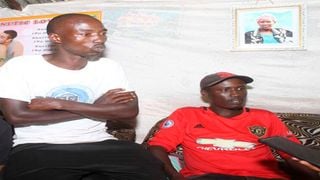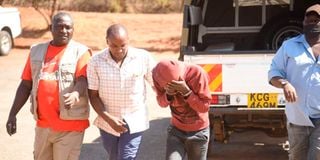
Mr Barnabas Njoroge (right) with other family members at their home in Kiamunyi Estate, Nakuru County on Monday. The remains of Mr Samuel Murathi, Mr Njoroge’s father, were exhumed at Kiptunga Forest recently, ending a 10-year search.
| John Njoroge | Nation Media GroupNews
Premium
10-year search for forester Samuel Murathi Njoroge ends with killer’s confession
Samuel Murathi Njoroge left home on March 9, 2012 to return to work at the Koibatek forest station in Kibunja, Molo sub-county, Nakuru.
He was supposed to later host a family gathering at his house in Kiamunyi, Rongai sub-county, but he was not seen again.
For the past 10 years, the family searched for him with hopes of finding him alive.
The search ended last week with a confession from alleged serial killer Moses Kipchirchir that he had killed Mr Njoroge and buried his remains in a shallow grave in the Kaptunga forest.
His remains were exhumed on Wednesday, December, 29, ending the decade-long search.
Mr Kipchirchir, who has confessed to killing three other people, including his wife, son and lover, revealed to the Directorate of Criminal Investigations in Mogotio chilling details of how he singlehandedly executed the murders.
On Mr Njoroge’s murder, the suspect said he killed the forest ranger when he confronted him in the forest while he was making charcoal illegally.
He said as he led detectives into the thick dark forest last week that he hacked the conservationist to death before burying him.
Mr Njoroge was reported missing by his seniors at the Koibatek forest station on March 12, 2012, prompting the family and authorities to start searching for him.

Suspected serial killer Moses Kipchirchir hides his face at Mogotio police station on December 27, 2021.
His eldest son Barnabas Njoroge said the family had searched for Mr Njoroge in the forest, prisons, hospitals and even morgues in vain.
On Thursday last week, Mr Barnabas said, the family received a call from Mogotio police informing them that a man in their custody had confessed to killing Mr Njoroge.
“We had searched for my father everywhere with the hope of finding him alive but unfortunately we were informed by the officers that someone had confessed to killing and burying him,” he said.
Police told the family that Mr Kipchirchir killed Mr Njoroge after he refused to accept a bribe of Sh1,200.
Mr Kipchirchir allegedly pounced on him with an axe, splitting his head and killing him instantly.
The suspect told police that he had killed a ranger, prompting them to follow up with officers from the Koibatek and Kibunja police stations, where he was reported missing.
Mr Barnabas said that the family was also told that the suspect burnt their father’s uniform and buried him naked to conceal evidence.
“We wonder why he did that to our father. He could have just followed him to the station and maybe they could have negotiated. He was a good man,” he said.
He said his father completed a three-month basic guard course at Kenya Forestry College in Londiani on March 16, 2007 and was posted to the Murang’a North forest zone.
He was transferred to Koibatek on May 26, 2011 and worked there for only 10 months before he was killed.
Mr Barnabas said the family’s problems started when his father, who was the only breadwinner, went missing. He had just completed secondary school and hoped to join college but had to end his education.
He started doing casual jobs to help his mother Jane Wanjiru fend for the family.
Ms Wanjiru, who was a homemaker before her husband’s death, also started working on people’s farms to earn money to pay her children's school fees.
Mr Barnabas said his mother died in 2020 after battling depression and hypertension for a long time. They suspected her health problems were caused by her husband's disappearance.
“I was left with the burden of raising my brothers and sister despite having my own young family. I cannot neglect them. I just struggle and share the little I earn from doing casual jobs,” he said.
The family now hopes that they will be given the remains of their father to bury, saying that was their mother’s last wish before she died.
“It is a relief that we have found his remains. We will just bury (them) next to my mother's grave so that she rests in peace. She really struggled to look for him in vain,” he said.
The family also wants the government to compensate them, saying their father died in the line of duty defending the environment.




